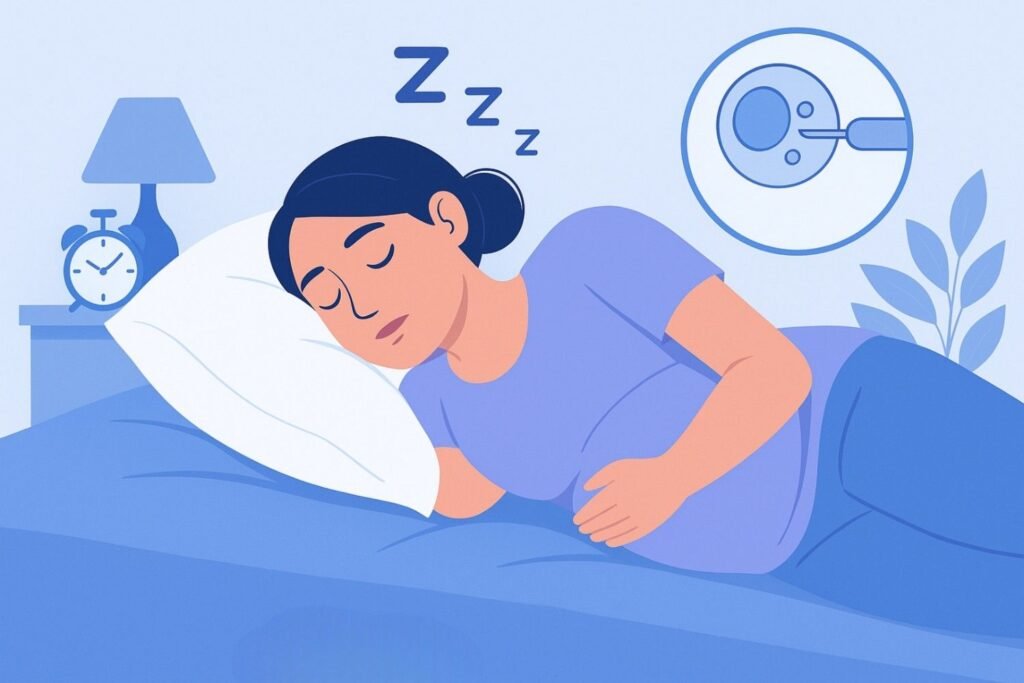IVF is not just a medical journey — it’s an emotional and physical transformation. While most couples focus on medications, scans, and appointments, one crucial factor often gets overlooked: sleep.
At Nex IVF Patna, we emphasize a holistic approach to fertility. Alongside cutting-edge treatment, we help you build healthy habits that improve your chances of conception — and quality sleep is one of them.
This blog explains why sleep matters during IVF, how it impacts your fertility, and practical ways to improve it during treatment.

Why Sleep is Essential During IVF
Sleep is when the body heals, restores hormones, and strengthens the immune system. During IVF, your body goes through:
- Hormonal changes due to ovarian stimulation
- Emotional highs and lows
- Physical fatigue from tests and procedures
All of these require deep, uninterrupted sleep to help your body and mind cope and recover.
How Poor Sleep Affects IVF Outcomes
Disrupted or insufficient sleep can negatively affect:
- Hormone balance – especially estrogen and progesterone, which are crucial for ovulation and implantation
- Insulin resistance – which may affect egg quality and ovarian response
- Cortisol levels – high stress hormones can interfere with embryo implantation
- Mood and emotional well-being – poor sleep can worsen anxiety or depression, common during IVF
Even studies show that women with better sleep patterns tend to have higher pregnancy rates during IVF.
Common Reasons for Sleep Problems During IVF
- Worry about treatment outcomes
- Hormonal changes affecting body temperature or mood
- Increased bathroom visits due to medications
- Disrupted daily routine or travel for appointments
- Emotional exhaustion from previous failed attempts
Understanding the cause is the first step toward better sleep.
Tips to Improve Sleep During IVF
Here are simple, doctor-recommended strategies from Nex IVF Patna to help you sleep better:
1. Create a Consistent Bedtime Routine
Go to bed and wake up at the same time every day — even on weekends. It regulates your body clock.
2. Avoid Screens Before Bed
Phones, tablets, and TVs emit blue light that disturbs melatonin, the sleep hormone. Try reading or light stretching instead.
3. Limit Caffeine and Heavy Meals
Avoid coffee, tea, and spicy foods at least 4–5 hours before bedtime.
4. Use Relaxation Techniques
Deep breathing, meditation, or calming music can help ease anxiety. You can also try guided sleep meditations.
5. Keep the Bedroom Cool and Dark
A quiet, comfortable environment signals your body to wind down naturally.
6. Talk It Out
Sometimes stress keeps you awake. Speaking with your partner or a counsellor at Nex IVF can help release that emotional pressure.
When to Seek Help
If you experience:
- Insomnia for more than a week
- Night sweats or severe restlessness
- Anxiety that affects daily functioning
- Dependence on sleeping pills
Speak to our team. Sleep support is a part of your care plan at Nex IVF Patna.
Our Holistic Approach to IVF Care
At Nex IVF Patna, we don’t just focus on lab reports. We focus on you — your mind, your sleep, and your emotional well-being.
Our complete care plan includes:
- Stress management guidance
- Fertility counselling
- Lifestyle support (including sleep and nutrition)
- 24×7 access to patient coordinators for reassurance
Final Words
Sleep is your body’s natural medicine — and during IVF, it becomes even more important. Rest is not a luxury; it’s a vital part of your fertility treatment.